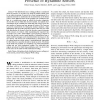Free Online Productivity Tools
i2Speak
i2Symbol
i2OCR
iTex2Img
iWeb2Print
iWeb2Shot
i2Type
iPdf2Split
iPdf2Merge
i2Bopomofo
i2Arabic
i2Style
i2Image
i2PDF
iLatex2Rtf
Sci2ools
105
Voted
CORR
2007
Springer
2007
Springer
Distributed Source Coding in the Presence of Byzantine Sensors
—The distributed source coding problem is considered when the sensors, or encoders, are under Byzantine attack; that is, an unknown group of sensors have been reprogrammed by a malicious intruder to undermine the reconstruction at the fusion center. Three different forms of the problem are considered. The first is a variable-rate setup, in which the decoder adaptively chooses the rates at which the sensors transmit. An explicit characterization of the variable-rate achievable sum rates is given for any number of sensors and any groups of traitors. The converse is proved constructively by letting the traitors simulate a fake distribution and report the generated values as the true ones. This fake distribution is chosen so that the decoder cannot determine which sensors are traitors while maximizing the required rate to decode every value. Achievability is proved using a scheme in which the decoder receives small packets of information from a sensor until its message can be decoded, b...
CORR 2007 | Education | Fake Distribution | Sensors | Traitors |
Related Content
| Added | 13 Dec 2010 |
| Updated | 13 Dec 2010 |
| Type | Journal |
| Year | 2007 |
| Where | CORR |
| Authors | Oliver Kosut, Lang Tong |
Comments (0)

